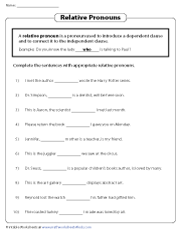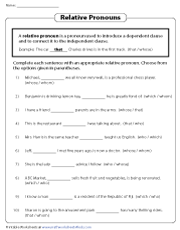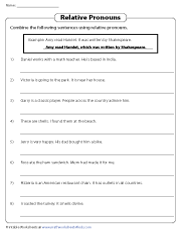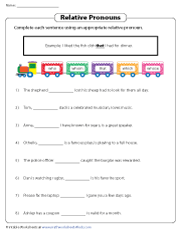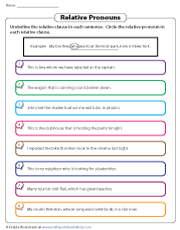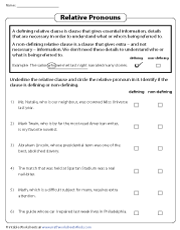- Worksheets>
- Language Arts>
- Grammar>
- Pronouns>
- Relative
Relative Pronouns Worksheets
Fill grade 4, grade 5, and grade 6 children in on a key aspect of pronouns with our printable relative pronouns worksheets! The purpose of a relative pronoun is to introduce a dependent clause and to connect it to the independent clause. The exercises include completing a sentence using correct relative pronouns, combining two sentences with suitable relative pronouns, identifying relative pronouns in a sentence, and more. An engrossing, transportive learning experience awaits you in our free relative pronouns worksheet with answers!
Completing Sentences Using Relative Pronouns
This worksheet on relative pronouns is a loving ode to the unique learning cachet of pronouns! Children in 4th grade complete each sentence with suitable relative pronouns like "who", "that", and "whose".
Choosing Relative Pronouns to Complete Sentences
Deciding if a sentence will do well with "that" or "which" is easier said than done! Pick from the relative pronouns given and complete the sentences correctly. Watch how relative pronouns grow on you!
Combining Clauses Using Suitable Relative Pronouns
Join the elite league that boasts mastery of relative pronouns with this relative pronoun exercise pdf! Two clauses are given – a dependent clause and an independent clause. Combine the clauses using correct relative pronouns.
Fill in the Blanks with Relative Pronouns
Deep-diving into the intricacies of relative pronouns feels like heaven! Choose an apt relative pronoun from the word box and complete each sentence. Don't worry if you use a relative pronoun more than once.
Underlining Relative Clauses & Circling Relative Pronouns
In this part of our printable relative pronouns practice worksheets, kids in grade 4 and grade 5 read each sentence and first identify the relative clause in it. Then they spot the relative pronoun that marks its beginning.
Identifying Relative Pronouns and Relative Clauses
Help 5th grade and 6th grade students to demystify the defining and non-defining clauses! While the former are not set off with commas, the latter are. Scout out the relative pronoun and clause; write if the clause is defining or non-defining.

